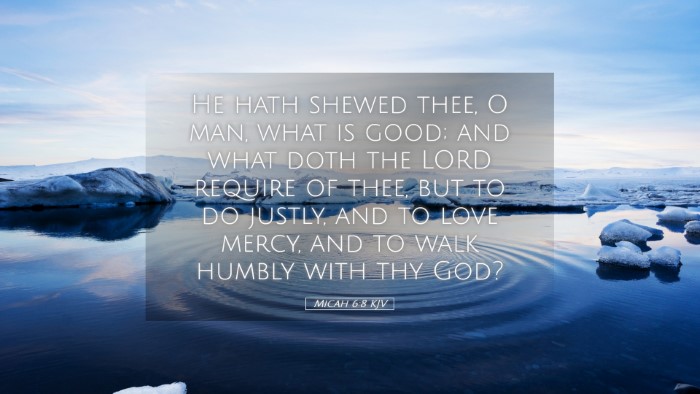Old Testament
Genesis Exodus Leviticus Numbers Deuteronomy Joshua Judges Ruth 1 Samuel 2 Samuel 1 Kings 2 Kings 1 Chronicles 2 Chronicles Ezra Nehemiah Esther Job Psalms Proverbs Ecclesiastes Song of Solomon Isaiah Jeremiah Lamentations Ezekiel Daniel Hosea Joel Amos Obadiah Jonah Micah Nahum Habakkuk Zephaniah Haggai Zechariah MalachiMicah 6:8
Micah 6:8 KJV
He hath shewed thee, O man, what is good; and what doth the LORD require of thee, but to do justly, and to love mercy, and to walk humbly with thy God?
Micah 6:8 Bible Commentary
Commentary on Micah 6:8
Verse: Micah 6:8 - "He hath shewed thee, O man, what is good; and what doth the LORD require of thee, but to do justly, and to love mercy, and to walk humbly with thy God?"
Introduction
This verse encapsulates the essence of what God desires from His people. In the context of Micah’s message, it serves as a divine indictment of ritualistic religion devoid of ethical living. The prophet Micah addresses both social justice and personal righteousness, presenting a holistic view of God’s expectations.
Exegesis of Micah 6:8
-
Divine Revelation: "He hath shewed thee, O man, what is good;"
According to Matthew Henry, this phrase emphasizes that God's requirements are not hidden or obscure. They are clearly revealed to humanity. God has not left us to guess at what is good; rather, He plainly instructs us through Scripture and the moral law.
-
Human Responsibility: "what doth the LORD require of thee;"
Albert Barnes notes that the phrase indicates a personal imperative. It is not society’s collective responsibility but an individual obligation to live righteously before God. This highlights that each person is accountable for their ethical conduct in their dealings with others and with God.
Three Pillars of God's Requirements
The verse notably outlines three key components that define how one should live:
-
To Do Justly:
This aspect denotes the importance of justice in all our dealings. Adam Clarke emphasizes that justice is foundational in the social structure. It involves not merely a legalistic adherence to the law but also entails fairness and integrity in personal and public life. Christians are called to advocate for the oppressed and to reflect God’s justice in their relationships.
-
To Love Mercy:
Matthew Henry reflects on mercy as an active love, requiring more than passive kindness. It is about genuinely valuing the welfare of others and actively seeking to promote it. Mercy involves compassion and a commitment to forgive, as God has forgiven us, and must be a continuous disposition of the heart.
-
Walk Humbly with Thy God:
The final exhortation emphasizes the need for humility before God. Albert Barnes postulates that to “walk humbly with God” suggests not only an awareness of one’s own frailty and dependence on God but also an acknowledgment of God’s sovereignty. It calls for a relationship characterized by submission, obedience, and a heart aligned with God’s will.
Theological Implications
This verse is foundational in understanding God's expectations for His covenant people. It juxtaposes ritualistic religion with genuine ethical living, reflecting God's nature. The requirements laid out in Micah 6:8 inform us that:
-
Ethics Over Ritual: God values our moral actions more than mere sacrifices. As Adam Clarke rightly posits, the moral life is integral to worship. True worship is evidenced through a life of justice, mercy, and humility.
-
Character Formation: The commands here are connected to character formation. Matthew Henry suggests that true goodness is developed within the heart as a reflection of one’s relationship with God.
Application for Today
For pastors, students, and theologians, Micah 6:8 serves not only as a call to personal righteousness but also a framework for societal engagement. In our current cultural and political climate, the themes of justice and mercy resonate deeply:
-
Justice in Society: The Church is called to be a voice for justice, advocating for those marginalized and oppressed, paralleling the command to promote just behavior.
-
Community Compassion: Loving mercy requires us to engage deeply with the needs of our communities and to respond with actionable compassion.
-
Personal Humility: Walking humbly with God invites a reflective posture, encouraging an attitude of prayerfulness and dependence on His guidance in every aspect of our lives.
Conclusion
Micah 6:8 provides a profound summary of God's requirements for His people, urging believers to engage in acts of justice, to embody mercy, and to cultivate a humble relationship with God. This verse challenges all who pursue faith to examine their lives, ensuring their actions align with God’s heart and His character.


